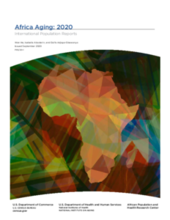This report illustrates current patterns and projected trends of population aging in Africa and empirical evidence of the socioeconomic circumstances and health status of older Africans. Two central themes are applied throughout the report: (1) the profoundly different nature of aging in Africa compared to other world regions; and (2) the important heterogeneity in aging experiences within Africa both between and within subregions and countries.
Data for this report come from many sources, including the U.S. Census Bureau’s International Data Base (IDB) and HIV/AIDS Surveillance Data Base, United Nations Population Division’s population data, World Health Organization (WHO) health data, Global Burden of Disease study data, International Labour Organization’s labor force partici-pation data, WHO Study on Global Ageing and Adult Health, as well as other published research and health data on aging and older populations in Africa.
Among other topics, the report explores older adults' living arrangements, noting that a majority of older adults live in large, multigenerational households while a rising number live in "skipped-generation arrangement," which refers broadly to households where the old and young generations live together with the middle generation absent. The report also highlights that older Africans, especially older women, play an active role of caregivers or guardians of younger-generation kin.

